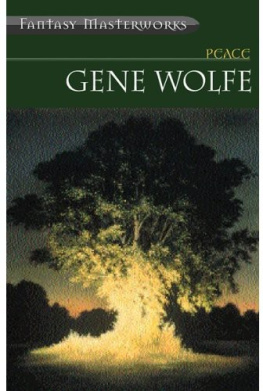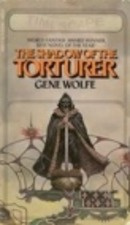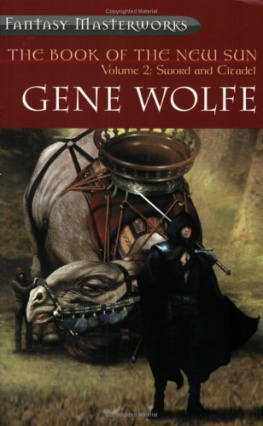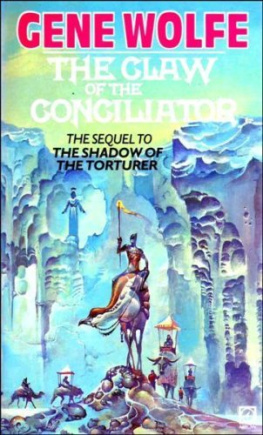Gene Wolfe - Peace (Fantasy Masterworks 28)
Here you can read online Gene Wolfe - Peace (Fantasy Masterworks 28) full text of the book (entire story) in english for free. Download pdf and epub, get meaning, cover and reviews about this ebook. year: 2002, publisher: Gollancz/Orion, genre: Detective and thriller. Description of the work, (preface) as well as reviews are available. Best literature library LitArk.com created for fans of good reading and offers a wide selection of genres:
Romance novel
Science fiction
Adventure
Detective
Science
History
Home and family
Prose
Art
Politics
Computer
Non-fiction
Religion
Business
Children
Humor
Choose a favorite category and find really read worthwhile books. Enjoy immersion in the world of imagination, feel the emotions of the characters or learn something new for yourself, make an fascinating discovery.
- Book:Peace (Fantasy Masterworks 28)
- Author:
- Publisher:Gollancz/Orion
- Genre:
- Year:2002
- Rating:3 / 5
- Favourites:Add to favourites
- Your mark:
- 60
- 1
- 2
- 3
- 4
- 5
Peace (Fantasy Masterworks 28): summary, description and annotation
We offer to read an annotation, description, summary or preface (depends on what the author of the book "Peace (Fantasy Masterworks 28)" wrote himself). If you haven't found the necessary information about the book — write in the comments, we will try to find it.
Peace (Fantasy Masterworks 28) — read online for free the complete book (whole text) full work
Below is the text of the book, divided by pages. System saving the place of the last page read, allows you to conveniently read the book "Peace (Fantasy Masterworks 28)" online for free, without having to search again every time where you left off. Put a bookmark, and you can go to the page where you finished reading at any time.
Font size:
Interval:
Bookmark:
Gene Wolfe
Fantasy Masterworks Volume 28
eGod
To Rosemary
THE ELM TREE planted by Eleanor Bold, the judges daughter, fell last night. I was asleep and heard nothing, but from the number of shattered limbs and the size of the trunk there must have been a terrible crashing. I wokeI was sitting up in my bed before the firebut by the time I was awake there was nothing to hear but the dripping of the melting snow running from the eaves. I remember that my heart pounded and I was afraid I was going to have an attack, and then, fuzzily, thought that perhaps the heart attack had wakened me, and then that I might be dead. I try to use the candle as little as I can, but I lit it then and sat up with the blankets around me, enjoying the candlelight and listening to the sound of the dripping snow and to the icicles melting, and it seemed to me that the whole house was melting like the candle, going soft and running down into the lawn.
This morning, when I looked out through the windows, I saw the tree. I took the cruiser ax and went out to it and chopped a few broken limbs finer still and put them on the fire, although it was no longer cold. Since my stroke I have been unable to use the big double-bitted Canadian ax, but at least twice a day I read it; Buntings Best, 4 lb. 6 oz., Hickory Handle has been burned into the wood. It was, in other words, branded, as though it were a steer; the three- or four- or five-hundredth time I read it, it finally came to me that this must be the origin of the phrase brand newtools like my ax (and no doubt other things as well, more when more things were made of wood) were branded with the manufacturers trademark after passing inspection, or by the inspector as a sign of approval. This would be the last manufacturing operationthey were then ready for sale and were brand new. It seems a pity that I have only thought of all that now, when there is no one to tell it to, but that may be for the best; there are many questions of that kind, as I have observed, to which people would sooner not know the answers.
While I was still living with my aunt Olivia, her husband bought her a Dresden figure of Napoleon for her mantel. (I suppose it is there yetit may well be; I should find her room and see.) Visitors often wondered aloud why he kept one hand thrust into his waistcoat. As it happened, I knew the cause, having read it a year or so beforeI believe in Ludwigs biography of him. At first I used to tell it in the hope of satisfying curiosity (and so obtaining those real though impalpable satisfactions, sweet at any time, but sweetest at thirteen, which accrue when we appear knowledgeable and thus, at least by implication, effective). Later I continued it as a psychological experiment, having observed that the innocent remark invariably offended.
My little fire is only smoldering now; but, dressed warmly as I am, this room is not uncomfortable. Outside the sky is leaden, and there is a breeze blowing. I have just taken a walk, and the weather feels ready for rain, though the ground is already so sodden by the melting snow. The half-warm wind is fit for spring, but I saw no other sign of it; the roses and all the trees still have hard, tight winter leaf buds; and, indeed, some of the roses still show (like mothers holding up their dead infants) the softly rotten shoots they put forth in the last warm weather of fall.
Sometimes I walk as much as possible, and sometimes as little as I can, but the difference is not great. I do it to comfort myself. If I have decided that walking will bring death closer yet to my left side, I plan each errand with care; first to the woodpile (next to the china elephant whose howdah is a cushion for my feet), then to the fireplace, then to my chair again, before the fire. But if it seems to me that exercise is required, I deliberately include small side trips: first to the fire to warm my hands, then to the woodpile, then back to the fire, and sit down glowing with hygienic virtue. Neither of these regimes seems to improve my condition, and I change physicians regularly. There is this to be said for doctors: they may be consulted though dead, and I consult Doctors Black and Van Ness.
I consult Dr. Black as a boy (though with a stroke), but Dr. Van Ness as a man.
I stand straight and six feet tall, a fine figure of a man, though twenty (Dr. Van Ness will say thirty) pounds underweight. It is important, going to the doctor. Even in some mad way more important than a board meeting. As I dress in the morning, I remind myself that I will be undressing not, as usual, for bed, but in the doctors office. It is a little like knowing I am going to be with a strange woman, and I shower after shaving and choose new shorts and undershirt and socks. At one-thirty I enter the Cassionsville and Kanakessee Valley Bank Building through bronze doors, more bronze doors to the elevator, and a glass door for the waiting room where five people sit listening to Glinkas A Life for the Czar. They are Margaret Lorn, Ted Singer, Abel Green, and Sherry Gold. And me. We are reading magazines, and the magazines are Life, Look, Todays Health, and Water World. Two of us are reading Life. Different issues, of course, and I am one of these readers, the other being Margaret Lorn. There is (as a matter of fact) a whole pile of Lifes before me, and I play the old game of trying to arrange them chronologically without looking at the dates, and lose. Margaret tosses down her copy and goes in to see the doctor, and I know, somehow, that this is a mark of contempt. I pick it up and find an area of the cover that is still warm (and slightly damp) from her hands. A nurse comes to the window and asks for Mrs. Price, and Sherry, who is sixteen now, tells her that she has already gone in, and the nurse looks aggrieved.
Sherry turns to Ted Singer: I have... Her voice sinks to a whisper. Ted says, Weve all got problems.
I go to the nurse, a woman I do not know, a blond woman who might be Swedish. I say, Please, Ive got to see the doctor. Im dying.
The nurse: All these people are ahead of you.
Ted Singer and Sherry Gold are both obviously much younger than I, but there is no use arguing with that kind of thing. I sit down again, and the nurse calls my nameinto a cubicle to undress.
Dr. Van Ness is slightly younger than I, very competent-looking in that false way of medical men on television dramas. He asks what seems to be the matter, and I explain that I am living at a time when he and all the rest are dead, and that I have had a stroke and need his help.
How old are you, Mr. Weer?
I tell him. (My best guess.)
His mouth makes a tiny noise, and he opens the file folder he carries and tells me my birthday. It is in May, and there is a party, ostensibly for me, in the garden. I am five. The garden is the side yard, behind the big hedge. It is a large yard, I suppose, even for adults, big enough for badminton or croquet, though not for both at once; for five it is enormous. Children come in boxy, tottering cars, as though they were toys being delivered in little trucks, the girls in pink lace dresses, the boys in white shirts and navy shorts. One boy has a cap, which we throw into the blackberries.
Today it is spring, a season that in the Midwest may last less than a week, leaving the jonquils to droop in the heat before they are well openedbut this is spring, true spring, the wind whipping the first dandelions for their birthday, once for this year, once for last, ten to grow on, and a pinch for an inch. Mothers dresses are a hands-breadth above their ankles, often of sensible colors; they like wide-brimmed, low-crowned hats, and jet beads. Their skirts flutter and they laugh, bending to gather them, holding the hats with one hand when the brims flap, the wind rattling their beads like the curtains in a Tunisian brothel.
Font size:
Interval:
Bookmark:
Similar books «Peace (Fantasy Masterworks 28)»
Look at similar books to Peace (Fantasy Masterworks 28). We have selected literature similar in name and meaning in the hope of providing readers with more options to find new, interesting, not yet read works.
Discussion, reviews of the book Peace (Fantasy Masterworks 28) and just readers' own opinions. Leave your comments, write what you think about the work, its meaning or the main characters. Specify what exactly you liked and what you didn't like, and why you think so.













